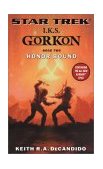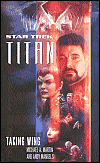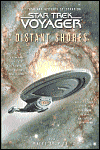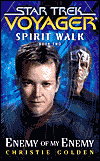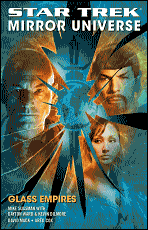
Star Trek: Mirror Universe: Glass Empires, by David Mack, Greg Cox, Mike Sussman, Dayton Ward
Book Review by David Roy
Have you read this book?
"Mirror Mirror" is one of the classic episodes of the original "Star Trek" television series. "Deep Space Nine" brought it back and made it all a bit silly, but the concept was still intriguing. A universe where all of the characters we know and love are strikingly different? Humans who are plain evil, harsh and ruthless? Say what you will about the "coincidence" of having all the same characters in the same area of space despite the differences in the universe, it was still a fun thing to think about. And then "Enterprise" did its two-part episode, "In a Mirror Darkly", ending with the delicious idea of meek little Hoshi Sato becoming Empress of the Empire.
Because of the Mirror Universe's popularity, it was almost a given that Pocket Books would do something with it, besides the odd book here and there. They came up with the idea of two books, with three novels in each one. The first, Glass Empires, deals with Enterprise, The Original Series, and The Next Generation. All three short novels in this collection are wonderfully written with intriguing ideas for how things might have come to pass in this universe. It helps that Pocket enlisted a great stable of writers for these books, as these guys know their Trek inside and out. Each writer takes bits and pieces of Trek history and weaves it into a beautiful tapestry, just off-kilter enough to be in the Mirror Universe instead of the one we know and love. And all of them are stellar tales.
"Age of the Empress" by Mike Sussman, with Dayton Ward and Kevin Dilmore
The Enterprise episode ended with Sato having taken the ship from our own timeline, the Defiant, and plotting her return to Earth to assume control of the Empire. This is her story, and of how she took the Andorian Shran as her consort, allowing the previously subjugated Andorians a bit of power. The various alien races around the Empire (the Vulcans, Andorians, Tellarites) have been rebelling against the Empire for years, and they would like nothing more than to capture this new Empress and behead the Empire before it can get any bigger. Only the Defiant is standing in their way. But Shran has plans of his own.
Sussman wrote the original Enterprise episodes, so it's quite cool that Pocket asked him to continue Sato's story. She's a woman who is, as ambitious as she is, in over her head when it comes to the politics of the Empire. I found her welcoming Shran to share power with her to be a little naive, considering she caught him helping the rebels, but it suits her character. The story has some great character work, with some of our favorites (and Mayweather too!) playing wonderfully against type. Since the story continues from the episode, the writers could use characterization set in the episode for the story, but they still manage to bring in some new, intriguing characters. Dr. Soong and Shran are two notable ones, but T'Pau (the Vulcan matriarch in "our" universe) is suitably devious as well.
I believe the story is Sussman's and Ward & Dilmore wrote a lot of the prose. Since they are two very experienced Trek novel writers, the writing is pretty much par for the course. It's interesting to see Sato's path from ambition to fear to utter callousness as the story goes on. This is a universe where even the "good" guys are pretty nasty people, and their characterization of the Vulcan rebels is quite good too. All in all, this is a great first story in the collection.
"The Sorrows of Empire" by David Mack
But then we get to David Mack's opus, which takes the first story and batters it around like it's a cat's chew toy. Mack was given the job of taking the end of the original "Mirror Mirror" episode, where our Jim Kirk convinced the Mirror Spock how important it was that the Terran Empire be reformed, and running with it. Spock takes this to heart, especially after his mind meld with McCoy where he sees exactly how the real Federation works. Spock uses force, treachery, and extremely devious tactics to worm his way up to becoming Emperor (as mentioned in the original DS9 episode) and then works to undermine the Empire from within. He wants to make it a Republic instead. He knows that the factions surrounding the Empire (the Klingons, Cardassians, Romulans) will be salivating at the thought of a weakened empire, but he also knows that the Empire is doomed to crumble from within unless something happens.
Mack's talent for characterization is well-known to Trek readers, but he's also known for his action. Surprisingly, there isn't a lot of it in this story. Instead, it's all political maneuverings and Spock using the insidious "Tantalus Field" (introduced in the original episode) to disintegrate his enemies from afar without them even being able to fight back. Spock has a plan, one that we're often as mystified about as his wife and father are. Mack saves the final revelation for the end and we see how things have reached the point where they were at in the DS9 episodes. The Terran Empire is gone, but Mack shows us that it may have been intentional. This story sheds new light on what we already know, making it more interesting than if it had just been a more detailed re-telling of what Mirror-Kira told us about the fall of the Empire. And it sets up some beautiful stuff for subsequent authors to savor.
It's also beautifully written as well. Mack succeeds in giving us not only a story where there isn't a lot of action, but he also makes us care about these characters despite knowing how it's all going to turn out. When we see bits and pieces of Spock's plan come to fruition, we cheer, but then we realize what he has just done to forward his plan and we feel a little sickened by our rooting for him. He's ruthless in his own way, and he's not about to let anybody stand in his way. Mack also gives us bits of Trek history that we know, turned just 90 degrees to the left to make it even more interesting. For one example, Dr. Carol Marcus and her Genesis Device (from Star Trek II) have an even more prominent role than they did in our universe. The story spans many years, so we see a lot of this type of thing. I'm not normally a continuity buff, but I found these bits very interesting. This is probably the best story in the collection.
"The Worst of Both Worlds" by Greg Cox
While this isn't the best in the collection, it's just a lot of fun. As any Trek fan can guess from the title, it's a mirror-version of the classic TNG episode where Captain Jean-Luc Picard takes on the Borg. But in the Mirror Universe, Picard is an archeologist who is sponsored by a Cardassian Gul (similar to an Admiral or Captain) who has an interest in historical trinkets. He's an Indiana Jones type (in fact, the first scene is very reminiscent of Raiders of the Lost Ark) with a human lover, Vash, who has joined the resistance against the Alliance. The Alliance of Klingons and Cardassians had taken over when Spock's republic fell, and now Terrans are subjugated. After delivering an artifact to Gul Madred, Picard meets up with Vash who introduces him to Dr. Noonian Soong, an expert in artificial intelligence. He's heard stories about this race called the Borg, and he wants to go find them. If they're as ruthless as the stories say, they could be a valuable ally against the Alliance. But when Picard and Soong come across them, they get a lot more than they bargained for. Will Picard be able to stop the unstoppable? Or will the Alliance meet its match, and all races will be consumed by the Borg?
This is an adventure story through and through. From the opening Raiders homage to the beautiful twisting of characters we know and love (or hate; I'm thinking of you, Vash), Cox captures everything brilliantly. This is how Picard would be if he weren't a starship captain. In fact, other than being a lower-class citizen in the Alliance due to his Terran heritage, I don't see that a lot would be different for Picard in our universe. He's a bit more ruthless than his counterpart, but overall he's just in it for the prestige and the joy of discovery. Cox again weaves pieces of TNG lore into the story, from the Borg themselves to Noonian Soong and Vash, and even to the Iconians. Not to mention the fact that Wesley-haters will be very pleased with what happens to him in this universe.
Cox writes in a breezy style that is a pleasure to read. He's not trying to be deep with this story, and it's not as poignant as Mack's story (despite a couple of attempts to make the Vash/Picard pairing palatable). It is what it needs to be: a thrilling romp with some tension as the hero makes some last second escapes and comes up with a brilliant plan to defeat the enemy. The Borg relentlessly go through the combined Klingon-Cardassian fleet, so we see a lot of starship action as well. Cox's prose is well-suited for this type of story, and his characterization of everybody (Picard especially) is top notch.
I liked all three stories in Glass Empires, and I would recommend them to any Trek fan. Other than referencing the episodes in question, none of the stories deals with anybody from our universe. You may think that you won't like reading about nothing but evil, ruthless people. Give this book a try, though. You might be mistaken.
Because of the Mirror Universe's popularity, it was almost a given that Pocket Books would do something with it, besides the odd book here and there. They came up with the idea of two books, with three novels in each one. The first, Glass Empires, deals with Enterprise, The Original Series, and The Next Generation. All three short novels in this collection are wonderfully written with intriguing ideas for how things might have come to pass in this universe. It helps that Pocket enlisted a great stable of writers for these books, as these guys know their Trek inside and out. Each writer takes bits and pieces of Trek history and weaves it into a beautiful tapestry, just off-kilter enough to be in the Mirror Universe instead of the one we know and love. And all of them are stellar tales.
"Age of the Empress" by Mike Sussman, with Dayton Ward and Kevin Dilmore
The Enterprise episode ended with Sato having taken the ship from our own timeline, the Defiant, and plotting her return to Earth to assume control of the Empire. This is her story, and of how she took the Andorian Shran as her consort, allowing the previously subjugated Andorians a bit of power. The various alien races around the Empire (the Vulcans, Andorians, Tellarites) have been rebelling against the Empire for years, and they would like nothing more than to capture this new Empress and behead the Empire before it can get any bigger. Only the Defiant is standing in their way. But Shran has plans of his own.
Sussman wrote the original Enterprise episodes, so it's quite cool that Pocket asked him to continue Sato's story. She's a woman who is, as ambitious as she is, in over her head when it comes to the politics of the Empire. I found her welcoming Shran to share power with her to be a little naive, considering she caught him helping the rebels, but it suits her character. The story has some great character work, with some of our favorites (and Mayweather too!) playing wonderfully against type. Since the story continues from the episode, the writers could use characterization set in the episode for the story, but they still manage to bring in some new, intriguing characters. Dr. Soong and Shran are two notable ones, but T'Pau (the Vulcan matriarch in "our" universe) is suitably devious as well.
I believe the story is Sussman's and Ward & Dilmore wrote a lot of the prose. Since they are two very experienced Trek novel writers, the writing is pretty much par for the course. It's interesting to see Sato's path from ambition to fear to utter callousness as the story goes on. This is a universe where even the "good" guys are pretty nasty people, and their characterization of the Vulcan rebels is quite good too. All in all, this is a great first story in the collection.
"The Sorrows of Empire" by David Mack
But then we get to David Mack's opus, which takes the first story and batters it around like it's a cat's chew toy. Mack was given the job of taking the end of the original "Mirror Mirror" episode, where our Jim Kirk convinced the Mirror Spock how important it was that the Terran Empire be reformed, and running with it. Spock takes this to heart, especially after his mind meld with McCoy where he sees exactly how the real Federation works. Spock uses force, treachery, and extremely devious tactics to worm his way up to becoming Emperor (as mentioned in the original DS9 episode) and then works to undermine the Empire from within. He wants to make it a Republic instead. He knows that the factions surrounding the Empire (the Klingons, Cardassians, Romulans) will be salivating at the thought of a weakened empire, but he also knows that the Empire is doomed to crumble from within unless something happens.
Mack's talent for characterization is well-known to Trek readers, but he's also known for his action. Surprisingly, there isn't a lot of it in this story. Instead, it's all political maneuverings and Spock using the insidious "Tantalus Field" (introduced in the original episode) to disintegrate his enemies from afar without them even being able to fight back. Spock has a plan, one that we're often as mystified about as his wife and father are. Mack saves the final revelation for the end and we see how things have reached the point where they were at in the DS9 episodes. The Terran Empire is gone, but Mack shows us that it may have been intentional. This story sheds new light on what we already know, making it more interesting than if it had just been a more detailed re-telling of what Mirror-Kira told us about the fall of the Empire. And it sets up some beautiful stuff for subsequent authors to savor.
It's also beautifully written as well. Mack succeeds in giving us not only a story where there isn't a lot of action, but he also makes us care about these characters despite knowing how it's all going to turn out. When we see bits and pieces of Spock's plan come to fruition, we cheer, but then we realize what he has just done to forward his plan and we feel a little sickened by our rooting for him. He's ruthless in his own way, and he's not about to let anybody stand in his way. Mack also gives us bits of Trek history that we know, turned just 90 degrees to the left to make it even more interesting. For one example, Dr. Carol Marcus and her Genesis Device (from Star Trek II) have an even more prominent role than they did in our universe. The story spans many years, so we see a lot of this type of thing. I'm not normally a continuity buff, but I found these bits very interesting. This is probably the best story in the collection.
"The Worst of Both Worlds" by Greg Cox
While this isn't the best in the collection, it's just a lot of fun. As any Trek fan can guess from the title, it's a mirror-version of the classic TNG episode where Captain Jean-Luc Picard takes on the Borg. But in the Mirror Universe, Picard is an archeologist who is sponsored by a Cardassian Gul (similar to an Admiral or Captain) who has an interest in historical trinkets. He's an Indiana Jones type (in fact, the first scene is very reminiscent of Raiders of the Lost Ark) with a human lover, Vash, who has joined the resistance against the Alliance. The Alliance of Klingons and Cardassians had taken over when Spock's republic fell, and now Terrans are subjugated. After delivering an artifact to Gul Madred, Picard meets up with Vash who introduces him to Dr. Noonian Soong, an expert in artificial intelligence. He's heard stories about this race called the Borg, and he wants to go find them. If they're as ruthless as the stories say, they could be a valuable ally against the Alliance. But when Picard and Soong come across them, they get a lot more than they bargained for. Will Picard be able to stop the unstoppable? Or will the Alliance meet its match, and all races will be consumed by the Borg?
This is an adventure story through and through. From the opening Raiders homage to the beautiful twisting of characters we know and love (or hate; I'm thinking of you, Vash), Cox captures everything brilliantly. This is how Picard would be if he weren't a starship captain. In fact, other than being a lower-class citizen in the Alliance due to his Terran heritage, I don't see that a lot would be different for Picard in our universe. He's a bit more ruthless than his counterpart, but overall he's just in it for the prestige and the joy of discovery. Cox again weaves pieces of TNG lore into the story, from the Borg themselves to Noonian Soong and Vash, and even to the Iconians. Not to mention the fact that Wesley-haters will be very pleased with what happens to him in this universe.
Cox writes in a breezy style that is a pleasure to read. He's not trying to be deep with this story, and it's not as poignant as Mack's story (despite a couple of attempts to make the Vash/Picard pairing palatable). It is what it needs to be: a thrilling romp with some tension as the hero makes some last second escapes and comes up with a brilliant plan to defeat the enemy. The Borg relentlessly go through the combined Klingon-Cardassian fleet, so we see a lot of starship action as well. Cox's prose is well-suited for this type of story, and his characterization of everybody (Picard especially) is top notch.
I liked all three stories in Glass Empires, and I would recommend them to any Trek fan. Other than referencing the episodes in question, none of the stories deals with anybody from our universe. You may think that you won't like reading about nothing but evil, ruthless people. Give this book a try, though. You might be mistaken.
|
Click here to buy Star Trek: Mirror Universe: Glass Empires, by David Mack, Greg Cox, Mike Sussman, Dayton Ward on Amazon
|
Star Trek: Mirror Universe: Glass Empires, by David Mack, Greg Cox, Mike Sussman, Dayton Ward on Amazon

| More Books You Might Like |
Comment on Star Trek: Mirror Universe: Glass Empires, by David Mack, Greg Cox, Mike Sussman, Dayton Ward
| Comments on Star Trek: Mirror Universe: Glass Empires, by David Mack, Greg Cox, Mike Sussman, Dayton Ward |
| There are no comments on this book. |
